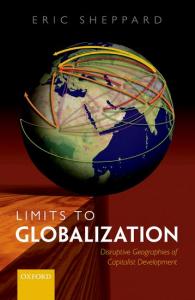Limits to Globalization: Geographical disruptions of capitalist development
Biography
This book provides a geographical understanding of globalizing capitalism, the economic system that has come to dominate the world over the past four centuries. What I call globalizing capitalism (‘globalizing’ because it is by no means ubiquitous notwithstanding its global influence) is often mis-named globalization. Discourses of globalizing capitalism, backstopped by neoclassical and geographical economic theory, represent it as the economic system that can enable all people and places to prosper (as long as it functions properly). Yet experience suggests otherwise: Socio-spatial inequality is remarkably persistent at every geographical scale, inequalities that have worsened during this neoliberalizing era (since the 1980s), when globalizing capitalism has come better than ever to approximate its ideal type. This book argues that a geographical perspective helps us appreciate why globalizing capitalism repeatedly fails to make good on this promise of development for all. Economists’ understanding of the role of geography is attenuated, concluding that persistent inequality is a place-based phenomenon—people and places are poor because they do not have the right attributes. A geographical perspective, one that both takes adequate account of how capitalist economic processes co-evolve with their spatial organization and analyses how the economy co-evolves with political, cultural and biophysical processes, leads to the conclusion that globalizing capitalism tends to reproduce rather than overcome inequality. This implies that that impoverishment under globalizing capitalism is relational: the uneven, asymmetric capitalist connectivities between people and places co-produce wealth and prosperity for some people and places with poverty and precarity for others.




